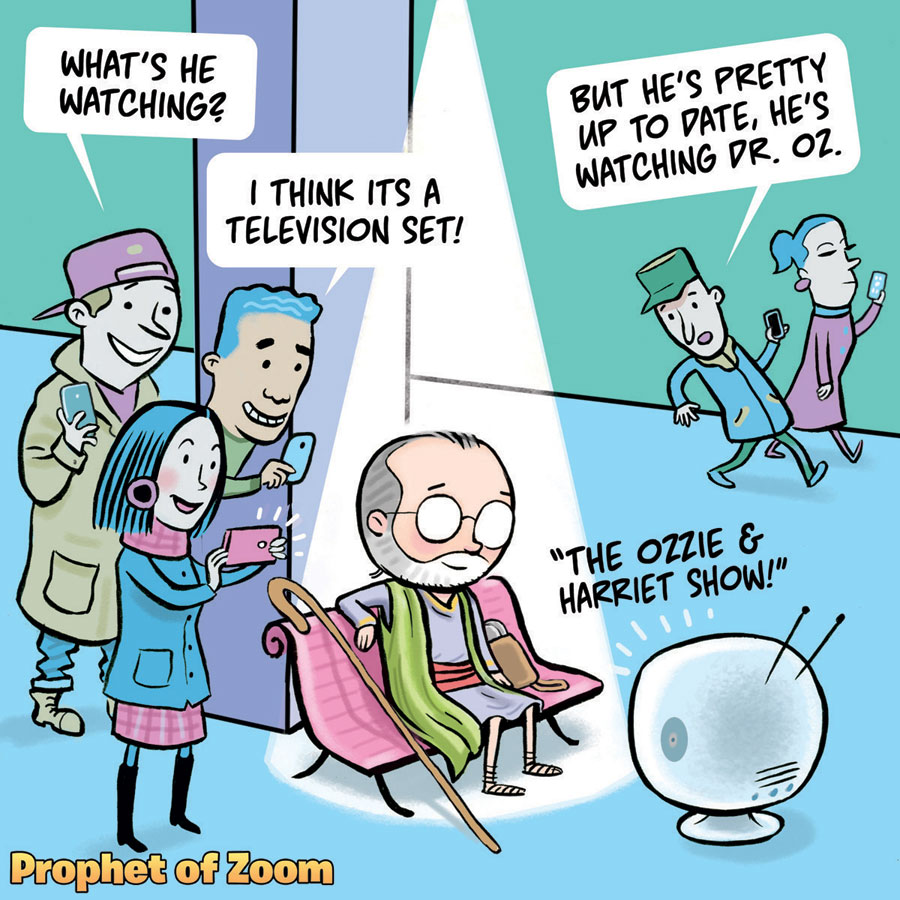Prophet of Zoom: Forward to the Past

We interrupt Regularly Scheduled Programming…to return to our Regularly Scheduled Programming.
I have always been a TV guy and probably always will be. But it was some startling news about a bookstore that got me thinking about how apropos our new name for our new back page is. This past November, Amazon – yes, that Amazon – opened its first bricks-and-mortar bookstore, an actual physical space with actual books and actual chairs in a mall in Seattle. Talk about the last word being the first word: Amazon to date has been the company that has made many actual bookstores extinct; now it’s bringing them back! Forget Back to the Future, this is Forward to the Past!
And Amazon’s only the tip of the iceberg. In the past five years, the American Booksellers Association increased its membership by 20 per cent while, in the first five months of last year, e-book sales dropped by 10 per cent. Sales of outdoor TV antennas – remember, those things on the roof? – are literally going through the roof lately. People are buying vinyl records in record numbers, online publications are advocating the rescue of the video rental store and at least one writer, David Rees, is hyping his creations not on Facebook and Twitter but by distributing actual paper fliers. He calls it his “analog social media strategy.” Our own recent readership numbers here at Zoomer, which have been rising in a landscape that’s supposed to be a wasteland for real paper-and-ink magazines you can hold in your hand, suggest that David Rees might be on to something.

Even TV – my old flame – is experiencing the same kind of retro recognition. Last Nov. 3, the same day Amazon opened its first new/old store, Vice, the popular Canadian youth magazine that spawned an online “global media empire,” announced it was taking over A&E’s History Channel and creating Viceland, a 24-hour specialty TV channel. Buzzfeed and the Huffington Post are also creating TV shows of their own. YouTube itself, which was supposed to be TV 2.0, has been peeking backwards. Teenagers who’ve created short videos that have gone viral are now trying to repeat their successes with subsequent videos, the ultimate prize being a regular YouTube slot – which Google, YouTube’s owner, is more likely to give them if they can draw ads to the site. Call me crazy, but I seem to recall a phrase we once had to describe this kind of arrangement: Regularly Scheduled Programming.
What’s going on? Rick Walker, who writes a design-technology column called “The Workologist” for the New York Times, says this doesn’t mean we’re going back to writing on parchment but that we’re realizing that classic technologies are classic for a reason: they have something unique to offer. Unique and tenacious. Robert Krulwich, the co-host of Radiolab, an award-winning program about “big ideas,” once tried to debunk another tech author’s claim that “There is no species of technology that has ever gone globally extinct.” Krulwich couldn’t do it. No matter how outmoded the example he came up with – even the eight-track tape – it was still being produced somewhere. Old media holdouts turn out to be really hard to bury.
So what does this have to do with us, with our generation, with CARP, with this magazine and our mission? Just this: we are the quintessential older medium that won’t go away. No matter how outmoded the world wants to think we are, we will never go extinct. Old people are always being produced somewhere; en masse, we’re really hard to bury. In other words, we are Regularly Scheduled Programming. And the most remarkable thing about our refusal to disappear is this: no matter how old we get, we usually have something new to offer.
Which is exactly what I propose as the mission of this new back page: to be the first word on what has always been seen as the last gasp. Not just a First Word recycling of old ideas but a revitalizing of them for new times. In the previous issue, I asked for suggestions for potential topics I might handle in this new incarnation of mine. More than one of you responded that we should tackle loneliness and loss, twin challenges that have always been part of the territory of living long. How do we survive loneliness, how do we conquer loss, how do we co-exist with both? And in sharing stories of loneliness and loss, can we become less isolated ourselves?
Meet me here next issue to find out: same time, same station.